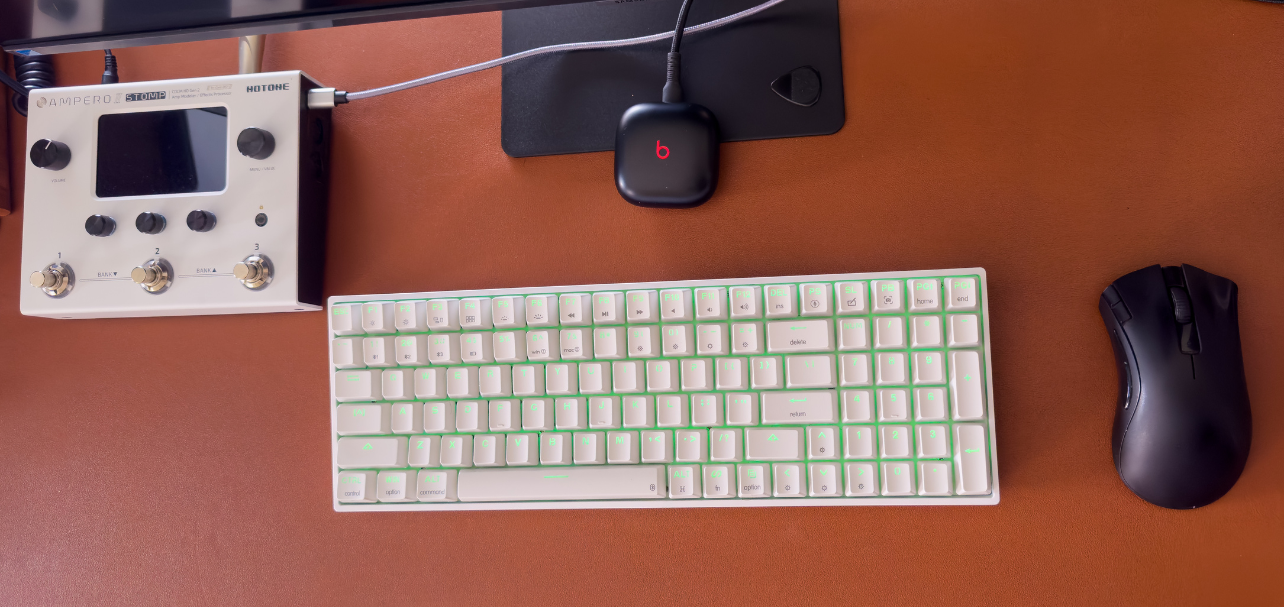Wireless vs. Wired Keyboards: Which is Right for You?

About a decade or so ago, the debate between wired vs. wireless peripherals was pretty cut and dry. Unless you absolutely had no other choice, wired devices were the way to go due to the limitations of wireless technology at the time, which resulted in lag and connection issues. In the present day, wireless peripherals have come a long way, with functionality basically as good wired devices for every use case that isn’t high-level, competitive gaming. Now, you could go wireless or wired since each type has its unique advantages and disadvantages, making the choice largely dependent on individual needs and preferences.
Wireless Keyboards
Advantages
- Portability and Flexibility: Wireless keyboards allow users to position them anywhere within range, making them ideal for dynamic work environments or setups that require frequent changes.
- Aesthetic Appeal: With no cables to clutter your desk, wireless keyboards contribute to a cleaner, more organized workspace.
- Convenience for Non-Traditional Use: Wireless keyboards are perfect for controlling devices from a distance, such as smart TVs or tablets.
Disadvantages
- Battery Dependence: Wireless keyboards require batteries or recharging, which can be a drawback if you forget to charge them or run out of batteries at an inconvenient time. It’s worth noting that most good wireless keyboards worth your money can just be charged via USB and last a pretty long time on a full charge.
- Potential Latency Issues: Although modern wireless technology has significantly reduced latency, some gamers and professionals who require lightning-fast response times may still notice a slight delay compared to wired keyboards. This can be a crucial factor for those in competitive gaming or elsewhere where milliseconds matter.
- Interference Risks: Wireless keyboards can experience interference from other devices operating on similar frequencies. While this is less common with today’s advanced technology, it remains a consideration, especially in environments with multiple wireless devices.
Wired Keyboards
Advantages
- Stable and Reliable Connection: Wired keyboards offer a consistent and stable connection without the risk of interference or connectivity drops. This reliability is particularly beneficial for gamers and professionals who require uninterrupted performance.
- Minimal Latency: With a direct connection, wired keyboards typically have lower latency than their wireless counterparts. This makes them a preferred choice for activities that demand quick response times, such as gaming.
- No Power Concerns: Wired keyboards do not require batteries or charging, eliminating the worry of running out of power during critical tasks.
Disadvantages
- Limited Mobility: The cable restricts movement, which can be a drawback if you frequently reposition your keyboard or switch between devices. This limitation can be inconvenient for those who value flexibility and adaptability in their workspace.
- Desk Clutter: The presence of a cable adds to the number of cords on your desk, which can create a cluttered appearance. For users who prefer a clean and organized workspace, this might be a significant downside.
My Take
My first big-boy keyboard was the Logitech G710+ with Cherry MX Brown switches, which I bought all the way back in 2015. At the time, it was an absolute revelation. I cared mainly about playing video games and not much else, least of all, any work/productivity tasks. I also didn’t have many other devices that utilized USB ports on my PC, so sacrificing two USB ports on my PC to power the thing and light it up seemed acceptable. 2015 Omair would’ve liked to think that he was utilizing the lower-latency capabilities (relative to wireless) of the keyboard when playing games like Call of Duty and League of Legends, but in retrospect, it’s unlikely.
Fast forward to the present:
- I’m definitely worse at video games and seldom play any ranked competitive games.
- I spend more time working than playing video games.
- I have many more devices on my desk that need to be connected to my PC.
- I’m much more bothered by clutter on my desk than I was as a younger man.
Given all these points, I switched to wireless once my faithful G710+ gave out after years of faithful use, and I haven’t looked back since. I use two USB-C cables for charging and connecting peripherals and phones as needed, leaving two more USB slots on my PC free for my microphone and external SSD.

Wrapping Up
The choice between wireless and wired keyboards ultimately depends on your personal preferences and needs. If portability, aesthetics, and convenience are your top priorities, a wireless keyboard is probably the way to go. If you dislike charging devices and would prefer to have your keyboard plugged in, or you really need the lowest latency possible, a wired keyboard will be the better choice. Alternatively, if you can spend extra for wireless capability, you could also have the best of both worlds by plugging in your keyboard when low latency is a priority and unplugging it when you want to reduce clutter.
Your Trust, Our Core Commitment
At Rising Tech, earning and maintaining your trust is the cornerstone of our mission. We're dedicated to transparency, impartiality, and the relentless pursuit of truth in every article, review, and recommendation we publish. Our commitment to these principles ensures that you, our valued reader, are always equipped with reliable and unbiased information. Let us be your trusted guide in the ever-evolving world of technology.